|
December 6, 2012 - Vol. 2
No. 12
Repeal
Putting
Students
First
Act
--
Bill
115!
Tens of Thousands of Elementary Teachers
Vote
to Lead Protest Against Bill 115
Repeal
Putting
Students
First
Act
--
Bill
115!
• Tens of Thousands of Elementary Teachers Vote
to Lead Protest Against Bill 115
- Laura Chesnik
• Resolute and Spirited Ottawa
Rally
• No to the Criminalization of Legitimate
Strike Actions!
• Minister Wants to Decide How Teachers and
Education Workers Resist
• Teachers and Education Workers Have a Mandate
for Their Opposition
- Enver Villamizar
Letter
to
the
Editor
• Kill Bill 115!
Significance of
Rejection of Non-Freely Negotiated Contracts
• Rejection
of Government Attempts to Divide and Conquer
• Rejection of Minister's Meddling With
Contracts
Coming
Events
• Actions to Oppose Bill 115
Why Broten Wants
Teachers and Education Workers to Limit Their Resistance
to the Courts
• The BC Experience in Challenging Anti-Labour
Laws in the Courts
• Significance of Supreme Court Ruling Against
BC Government and Bill 29 - TML Daily, March 3, 2008
Repeal Putting Students First Act -- Bill
115
Tens of Thousands of Elementary Teachers Vote
to Lead
Protest Against Bill 115
- Laura Chesnik -
 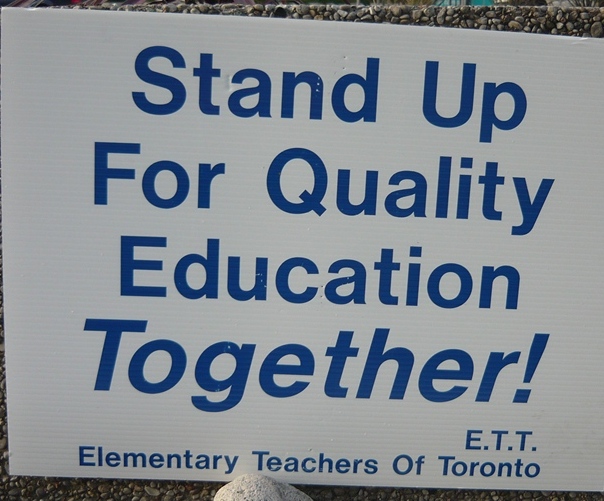 
Elementary teachers have once again put the lie to
government
disinformation that they don't want to challenge Bill 115 and that its
just their "union leaders." From December 2 to 4, 92 per cent of over
46,000
elementary teachers voted in favour of holding a province-wide protest
if Minister Broten uses the arbitrary
powers the government and the PCs bestowed upon her in the Putting
Students First Act (Bill
115) to stop one-day strikes planned by ETFO locals, or impose a
contract. The vote comes following overwhelming No votes by five out of
six
high school teacher bargaining units to the agreements presented
to them that were aimed at taking them out of the growing fight against
Bill 115. At every opportunity, teachers and education workers, joined
by students have shown how bogus the government' s claim is that it has
the support of the people for its austerity agenda or that it is
"putting students first." The question
people are now asking is: besides the leadership of the Liberals and
PCs, who in the province doesn't want Bill 115 repealed?
The vote was held online and had to be extended by 24
hours due to the overwhelming response.
Announcing the results, ETFO President Sam Hammond
stated: "ETFO
teachers, occasional teachers, education support personnel,
professional support personnel, and designated early childhood
educators are saying they will lead the protest against Bill 115 if the
education minister denies them their fundamental
rights."
"This vote affirms once again that it is our members who
determine
their actions through democratic processes, contrary to Minister
Broten's derogatory comments about union leaders this week," added
Hammond. "It is unfortunate that her government crafted a law that
allows no judicial appeal in the provincial
courts — a tactic rarely if ever used in democracies. Our members have
been left with little recourse but to choose a political protest," he
added.
"Bill 115 is an affront to the fundamental rights not
only of
educators but of all Ontarians. By this vote, our members are saying
they are prepared to stand up for democracy," he concluded.
In related news, on December 5 it was announced that two
locals of
the Elementary Teachers' Federation of Ontario (ETFO) — Avon-Maitland
(Stratford area) and Ontario North East (including Kapuskasing, New
Liskeard and Timmins) — will be the first in ETFO's rotating one-day
strikes in the province. On
December 10, these two locals will withdraw all services and schools
will be shut down. Everyone should stand with teachers and education
workers as the strike actions begin and find ways to support them
concretely, especially if the government tries to prevent their
actions. As ETFO has pointed out on their billboards:
If you work in Ontario this is your fight!

Resolute and Spirited Ottawa Rally
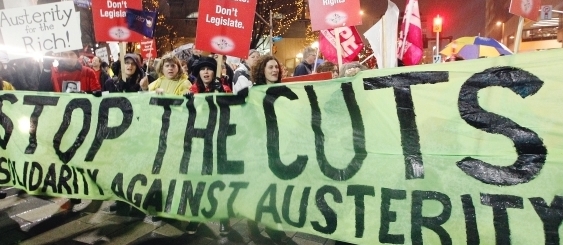
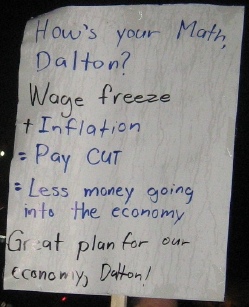 Close to 900 teachers, other education workers and their
supporters vigorously demonstrated at the Ottawa Convention Centre on
December 4, where Dalton McGuinty was speaking at a Liberal Party
fundraiser. The demonstrators gathered to express their opposition to
Bill 115 and repeatedly shouted "Kill the
Bill!" Many carried placards denouncing the attacks on democracy and
their rights. Close to 900 teachers, other education workers and their
supporters vigorously demonstrated at the Ottawa Convention Centre on
December 4, where Dalton McGuinty was speaking at a Liberal Party
fundraiser. The demonstrators gathered to express their opposition to
Bill 115 and repeatedly shouted "Kill the
Bill!" Many carried placards denouncing the attacks on democracy and
their rights.
The demonstration began in the late
afternoon and continued for several hours, filling Colonel By Drive in
front of the Convention Centre. Among the participants were teachers
and workers represented by the Elementary Teachers' Federation of
Ontario (ETFO), Ottawa Carleton Elementary Teachers' Federation
(OCETF), Ontario Secondary School Teachers' Federation (OSSTF),
Canadian Union of Public Employees (CUPE), and Public Service Alliance
of Canada (PSAC).
A call for the rally from Janet Fraser, the 1st
Vice-President of the OCETF, calls on teachers, workers and citizens to
stand together. "This undemocratic bill," it continues, "sets a very
dangerous precedent for all workers. It is a clear attack on unions and
workers." It states that Bill 115 targets education workers,
"giving unprecedented power to Cabinet and the Education Minister,
overriding the Canadian Charter of Rights and Freedoms,
preventing access to the Ontario Labour Relations Act,
precluding access to the Ontario Human Rights Tribunal [and] preventing
free collective bargaining." It asks:
"Who will be next?"
Speakers called for the repeal of the bill and expressed
their support for the teachers and other education workers.

No to the Criminalization of Legitimate Strike Actions!
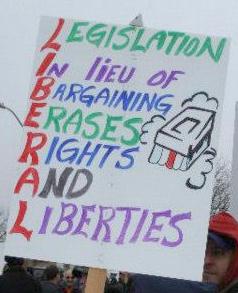  
How teachers and education workers can defend
their rights and how they should proceed in order to build the momentum
against Bill 115 and not fall into government traps is on everyone's
mind. In working this out, they now also have to contend with threats
which would indicate that the Ontario government is preparing
conditions to criminalize the legitimate strike actions of Ontario's
teachers and education workers.
The Arbitrary December 31 Deadline
After December 31, according to Bill 115, the Minister
can advise the Lieutenant Governor-in-Council to impose the Ontario
Elementary Catholic Teachers' Union (OECTA) Memorandum of Understanding
on teachers and education workers who have not accepted
Minister-approved non-freely negotiated
collective agreements. If she invokes these powers and a contract is
imposed, all normally legal collective job actions can be deemed
illegal because a new contract is in place. Under Bill 115 the Minister
can also declare these actions illegal before December 31. If a new
contract is imposed, the government can try
to prohibit unions from: "calling or authorizing or threatening to call
or authorize a strike by any of the employees that it represents," and
"counselling, procuring, supporting or encouraging a strike by any of
the employees that it represents." It can also direct the union and its
members "to immediately terminate any
strike that is in effect on the day the order is made." These days it
is not just traditional strike action - withdrawal of labour - that is
labelled a strike, but any collective job action.
Growing Opposition and Refusal to Submit
 The situation for the
government has become more tenuous after four out of five high school
teacher
bargaining units resoundingly rejected the unfreely negotiated
tentative agreements the Provincial Executive of their union signed
with school boards following intense negotiations, with the Minister of
Education
and her "team" the ultimate arbiter. The situation for the
government has become more tenuous after four out of five high school
teacher
bargaining units resoundingly rejected the unfreely negotiated
tentative agreements the Provincial Executive of their union signed
with school boards following intense negotiations, with the Minister of
Education
and her "team" the ultimate arbiter.
The government had hoped that members of OSSTF would
take the rotten bait being dangled in front of them and agree to the
Minister-approved deals presented to them. However, the rejection shows
that the lesson has been learned from the way in which the Catholic
Teachers' union was used by the McGuinty
government early on in the process to try and divide teachers and
education workers and pick unions off one by one so as not to have
broad unity against the government's dictate and the theft of billions
from education.
This government scheme has fallen apart with the No
votes and with a number of Catholic teacher units publicly saying they
oppose the OECTA MOU through their own votes.
In response to the No votes as well as impending
rotating one-day strike actions by elementary teachers, the
McGuinty-Hudak austerity tag team is preparing conditions to use the
arbitrary powers they gave themselves in Bill 115 to criminalize any
further resistance of teachers and education workers. It is
unacceptable
and shows that despite claims the legislation does not make strikes
illegal, this is precisely what is being put in place.

Minister Wants to Decide How Teachers and
Education
Workers Resist
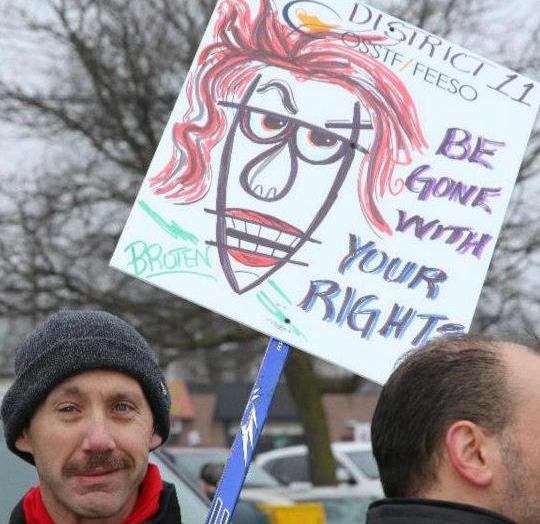 Education Minister Laurel
Broten is claiming that union leaders can oppose Bill 115, but only in
a manner acceptable to her -- through the court challenge, and not
through strikes. Some of the monopoly-owned media is parroting this
line to try and present pure dictate as rational, even reasonable.
Interestingly
Broten did not say that the unions should oppose Bill 115 by defeating
the Liberals and the PCs in a provincial election -- only through the
courts. Education Minister Laurel
Broten is claiming that union leaders can oppose Bill 115, but only in
a manner acceptable to her -- through the court challenge, and not
through strikes. Some of the monopoly-owned media is parroting this
line to try and present pure dictate as rational, even reasonable.
Interestingly
Broten did not say that the unions should oppose Bill 115 by defeating
the Liberals and the PCs in a provincial election -- only through the
courts.
Meanwhile the Hudak Conservatives are helping the
Liberals to try and spook teachers and education workers into not
thinking by calling on the government to use the arbitrary powers in
the legislation right away. The Liberals' approach is the so-called
"balanced approach:" "use the courts to oppose, not strikes"
while the Conservatives' is presented as the right wing approach: "no
opposition allowed; austerity must be imposed now." Both amount to the
same thing - dictate to teachers and education workers what they can
and cannot do in order to remove billions from education.

Teachers and Education Workers Have a Mandate
for Their
Opposition
- Enver Villamizar -
Teachers and education workers' unions have democratic
mandates from their membership for their actions, as expressed in the
massive votes in favour of strike action by members of ETFO, OSSTF and
CUPE. This shows that teachers and education workers have given their
unions a mandate to oppose government
dictate, both through the courts and through strikes.
The government, on the other
hand, has no mandate for its actions despite McGuinty's bogus claims
that everyone supports what he is doing. McGuinty said nothing about
any austerity schemes -- which were already being planned in secret --
during the provincial election. When it became clear that his
government
was hell bent on attacking teachers and education workers and imposing
a broad austerity agenda, the public gave a fitting reply with the
defeat of both the Liberals and the PCs in the Kitchener-Waterloo
by-election.
 Given all this, it is not
teachers and education workers
or their unions, but the government which is undermining the rule of
law with its arbitrariness and operating outside of any mandate it
claims to have. It is using its hold on power and the fact that the
legislature has been eliminated to create a situation of
anarchy where no one knows what to expect and no pre-existing norms and
rules apply; where only the government has rights, while the people who
provide education to the youth are set up to be criminalized for
exercising their rights. The government's insistence that teachers and
education workers should only
use the courts is a set-up to try and undermine their effective
opposition. This is made clear when one considers: 1) the government
acknowledged they knew the legislation would likely be challenged in
the courts and surely wrote it to prepare for this, and 2) the
legislation tries to shield itself from legal challenges,
showing it is also aimed at limiting the powers of labour and human
rights bodies and the lower courts during a period when the law is
being constitutionally challenged. Given all this, it is not
teachers and education workers
or their unions, but the government which is undermining the rule of
law with its arbitrariness and operating outside of any mandate it
claims to have. It is using its hold on power and the fact that the
legislature has been eliminated to create a situation of
anarchy where no one knows what to expect and no pre-existing norms and
rules apply; where only the government has rights, while the people who
provide education to the youth are set up to be criminalized for
exercising their rights. The government's insistence that teachers and
education workers should only
use the courts is a set-up to try and undermine their effective
opposition. This is made clear when one considers: 1) the government
acknowledged they knew the legislation would likely be challenged in
the courts and surely wrote it to prepare for this, and 2) the
legislation tries to shield itself from legal challenges,
showing it is also aimed at limiting the powers of labour and human
rights bodies and the lower courts during a period when the law is
being constitutionally challenged.
The set-up is to have teachers, education workers and
their unions give up their mandates so as to just watch the courts and
the American Idol-style spectacle of the Liberal leadership race in
hopes that a non-existent saviour will emerge that will save them. No
way!

Letter to the Editor
Kill Bill 115!
If the government is serious about wanting to avoid
strikes it should repeal Bill 115, simple as that. If the government
does not, teachers and education workers, along with the entire working
class in Ontario should continue to mobilize everyone to stand as one
against the use of the powers in Bill 115 so as to
make the law ineffective. This includes working out how to defeat both
the Liberals and PCs in a general election.
If the law is repealed or made ineffective, things can
be sorted out in a more rational manner through negotiation without a
gun to anyone's head. This will favour the rule of law, the education
system, students and parents and the society. It will also show that
governments can and must be held to account.

Significance of Rejection of Non-Freely
Negotiated Contracts
Rejection of Government
Attempts to
Divide and Conquer
At information meetings prior to ratification votes on
the non-freely negotiated collective agreements, in social media and
other venues, members of OSSTF have expressed a strong desire to stand
with their counterparts in the Elementary Teachers' Federation of
Ontario who will shortly begin rotating strikes as the Minister of
Education issues threats to order an end to or even pre-empt them. One
of the reasons OSSTF members gave for calling for the tentative
agreements to be voted down was that their colleagues in ETFO should
not be abandoned to fight on their own; that the government's divide
and conquer approach to the sector would only be defeated by everyone
standing together in defence of their rights.

Rejection of Minister's Meddling With Contracts
 On December 4 the Teachers'
Bargaining Unit of OSSTF
District 17 -- Simcoe announced it does not have a tentative agreement
to present to its members for ratification because language was added
to the tentative agreement during the Ministerial "pre-approval"
process that was not signed by the bargaining
team. "This event occurred as a direct result of Bill 115 and
restrictions imposed through a process lacking transparency that
interfered with local bargaining as per the Labour Relations Act," the
release stated. "We understand this may upset some parents and
students" said the president of the bargaining unit, adding
"We hope this can be used as a learning opportunity so that students
can realize that the fight for democracy and democratic rights should
be supported and not be taken lightly. We are fighting for their future
rights and the rights of all working Ontarians. We will continue to
fight for the repeal of Bill 115." On December 4 the Teachers'
Bargaining Unit of OSSTF
District 17 -- Simcoe announced it does not have a tentative agreement
to present to its members for ratification because language was added
to the tentative agreement during the Ministerial "pre-approval"
process that was not signed by the bargaining
team. "This event occurred as a direct result of Bill 115 and
restrictions imposed through a process lacking transparency that
interfered with local bargaining as per the Labour Relations Act," the
release stated. "We understand this may upset some parents and
students" said the president of the bargaining unit, adding
"We hope this can be used as a learning opportunity so that students
can realize that the fight for democracy and democratic rights should
be supported and not be taken lightly. We are fighting for their future
rights and the rights of all working Ontarians. We will continue to
fight for the repeal of Bill 115."

Coming
Events
Actions to Oppose Bill 115

Laurel Broten,
Liberal Minister of Education
-- Etobicoke-Lakeshore
Friday, December 7
-- 4:00 pm
701 Evans Avenue, Toronto
Monte Kwinter, Liberal -- York Centre
Friday, December 7 -- 4:00
pm
539 Wilson Heights Blvd. (South of Sheppard Ave. W.) North
York
Joe Dickson, Liberal -- Ajax-Pickering
Friday, December
7 -- 4:00
pm
50 Commercial Avenue, Ajax
Tim Hudak, Conservative -- Niagara West - Glanbrook
Friday, December 7 -- 3:30
- 5:00 pm
4961 King St. E., Unit M1, Beamsville
Michael Coteau, Liberal -- Don Valley East
Friday December 14 -- 4:00
pm
2062 Sheppard Avenue East , Toronto
Tracy MacCharles, Liberal -- Pickering-Scarborough
East
Friday, December 14 --
4:00 pm
Waterfront Bistro, Liverpool Road, Pickering
Thunder Bay
Liberal Leadership Debate
Sunday, December 9
-- 12:00 noon
Lecture Hall 1103, ATAC Building, Lakehead University
Bancroft Rally and
March
Solidarity in Education
Tuesday, December 11 --
4:00 pm
14 Monck Street
Download poster here
Belleville Rally and
March
Solidarity in Education
Tuesday, December 11 --
4:00 pm
Education Centre, 156 Ann Street
Download poster here
Hamilton Rally and March
Stand Up Fight Back! Repeal Bill 115 Now!
Saturday,
December
15 -- 10:00 am
City Hall, 71 Main Street West, Hamilton
Flyering to defend workers' rights every day at King and James -- 3:30
pm
Download poster here
Ottawa
Liberal Leadership Debate
Tuesday, December
18 -- 6:00 pm
River Theatre, Carleton University - 125 Colonel By Drive


Why Broten Wants Teachers and Education
Workers to Limit
Their Resistance to the Courts
The BC Experience in Challenging Anti-Labour
Laws in the Courts
Teachers’
and education workers’ unions in Ontario have launched a court
challenge to the Putting Students First Act. Although the
contents of the challenge have not yet been made public the main
argument appears to be that the legislation violates the right to
collective bargaining which is protected in the Charter of Rights and
Freedoms. The challenge is an important aspect of the all round
opposition taking place in Ontario to the McGuinty government's
anti-worker and anti-social agenda.
Since the introduction of the legislation, and likely
before, the McGuinty government has been very conscious of the fact
that the legislation would likely be challenged in the courts. When
this was raised in the legislature McGuinty responded that "The Supreme
Court of Canada has set out some basic rules that
you have to follow to ensure that ultimately we can hit the pause
button on public sector pay. So we started back in January..."
One of the experiences of
the Canadian working class
which is important to consider to understand McGuinty's arrogance
regarding the legislation and the extreme measures his government is
taking to steal $2.19 billion from education is the experience of the
British Columbia health care workers. In 2007 they
brought an appeal of the Health and Social Services Delivery
Improvement Act (Bill 29) passed by the Campbell Liberals in
2002 to the Supreme Court of Canada.
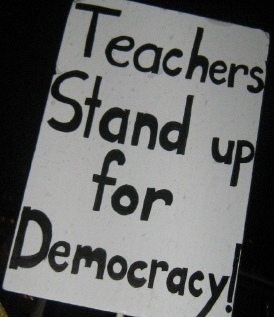 The decision of the court
in that matter affirmed that
collective bargaining is protected under the Charter of Rights and
Freedoms. This was an affirmation of the right of workers to
organize
collectively to defend their interests. It is likely this is the
precedent upon which the challenge in Ontario will in part base itself.
In addition to this affirmation however, the decision of the Court
affirmed the Liberal government’s justifications for the "crisis of
sustainability" and the necessity to impose anti-worker measures as a
solution. The Supreme Court in the BC case took issue with the way in
which the anti-worker measures were imposed, rather than the content of
its attacks. This is likely why McGuinty is very conscious of trying to
promote the Provincial Discussion Table (PDT) discussions as a
consultative
process in which the government tried to get the unions to "understand"
the "crisis" Ontario is in and voluntarily accept the anti-worker
measures. No doubt the deal with the Catholic teachers' union at the
PDT will also be cited as proof that "some" unions understood the
crisis and accepted the bitter medicine. It is also likely why McGuinty
has been so vicious in trying to claim that the legislation is aimed at
defending "gains in the classroom" and presenting teachers and
education workers’ unions as threats to Ontario's financial well-being.
He is trying to present anti-worker, anti-social measures as reasonable
to "protect children" through programs such as full day kindergarten,
the same way the Campbell government argued that its measures were
required to defend healthcare from a "crisis of sustainability." This
will no doubt be cited as the high ideals of the government in court to
justify its violation of rights as reasonable under the circumstances
of a crisis of the government’s own creation. The decision of the court
in that matter affirmed that
collective bargaining is protected under the Charter of Rights and
Freedoms. This was an affirmation of the right of workers to
organize
collectively to defend their interests. It is likely this is the
precedent upon which the challenge in Ontario will in part base itself.
In addition to this affirmation however, the decision of the Court
affirmed the Liberal government’s justifications for the "crisis of
sustainability" and the necessity to impose anti-worker measures as a
solution. The Supreme Court in the BC case took issue with the way in
which the anti-worker measures were imposed, rather than the content of
its attacks. This is likely why McGuinty is very conscious of trying to
promote the Provincial Discussion Table (PDT) discussions as a
consultative
process in which the government tried to get the unions to "understand"
the "crisis" Ontario is in and voluntarily accept the anti-worker
measures. No doubt the deal with the Catholic teachers' union at the
PDT will also be cited as proof that "some" unions understood the
crisis and accepted the bitter medicine. It is also likely why McGuinty
has been so vicious in trying to claim that the legislation is aimed at
defending "gains in the classroom" and presenting teachers and
education workers’ unions as threats to Ontario's financial well-being.
He is trying to present anti-worker, anti-social measures as reasonable
to "protect children" through programs such as full day kindergarten,
the same way the Campbell government argued that its measures were
required to defend healthcare from a "crisis of sustainability." This
will no doubt be cited as the high ideals of the government in court to
justify its violation of rights as reasonable under the circumstances
of a crisis of the government’s own creation.
For your information, Ontario Political Forum
is reprinting excerpts of the article: "Significance of Supreme Court
Ruling Against BC Government and Bill 29" originally printed in The Marxist-Leninist Daily on March
3, 2008.

Significance of Supreme Court Ruling Against BC
Government and Bill 29
- TML Daily, March 3, 2008 -
In 2002, the Campbell Liberals in BC as part of their
anti-social offensive brought Bill 29, the Health and Social Services
Delivery Improvement Act, which removed or rewrote contracting
out,
seniority and other provisions of health care and community social
services collective agreements. The legislation also
imposed restrictions on the right of the workers to collective
bargaining, as well as excluding health care and community social
services workers from successorship provisions of the BC Labour Code
(rules whereby a new employer can be obligated to bargain collectively
with the existing union at the newly acquired
facility). Health care unions challenged Bill 29 all the way to the
Supreme Court of Canada.
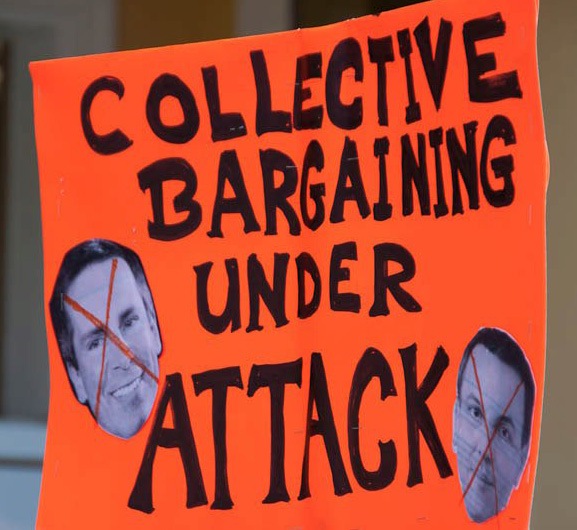 On June 8, 2007 the Supreme
Court of Canada issued its
decision in the Health Services and
Support-Facilities Subsector
Bargaining Assn. v. British Columbia, 2007 SCC 27 case, the
appeal of
Bill 29 brought by the health care unions. The Supreme Court allowed in
part the appeal and ruled Sections 6(2), 6(4),
and 9 of the Act (Bill 29) unconstitutional. The declaration was
suspended for a period of 12 months to give the BC government one year
to deal with the repercussions of the ruling and permit the government
and the unions to negotiate a settlement. The unions have recently
reached an agreement on a settlement
with the government and are now seeking ratification from their
membership. On June 8, 2007 the Supreme
Court of Canada issued its
decision in the Health Services and
Support-Facilities Subsector
Bargaining Assn. v. British Columbia, 2007 SCC 27 case, the
appeal of
Bill 29 brought by the health care unions. The Supreme Court allowed in
part the appeal and ruled Sections 6(2), 6(4),
and 9 of the Act (Bill 29) unconstitutional. The declaration was
suspended for a period of 12 months to give the BC government one year
to deal with the repercussions of the ruling and permit the government
and the unions to negotiate a settlement. The unions have recently
reached an agreement on a settlement
with the government and are now seeking ratification from their
membership.
The decision was a blow to the Campbell government,
stating that governments could not simply tear up collective agreements
at a moment's notice and declare their duly negotiated provisions null
and void. This action violated the right to collective bargaining, the
court stated. On this basis key sections of Bill
29 were declared unconstitutional and a violation of the Charter of
Rights and Freedoms. In this sense it was a clear victory for
the
unions.
The Supreme Court clearly addressed the rights of
workers and the aim to uphold the dignity of labour. It stated:
"The right to bargain collectively with an employer
enhances the human dignity, liberty and autonomy of workers by giving
them the opportunity to influence the establishment of workplace rules
and thereby gain some control over a major aspect of their lives,
namely their work."
"Collective bargaining also enhances the Charter value
of equality."
"Finally, a constitutional right to collective
bargaining is supported by the Charter
value of enhancing democracy."
With such fine words, one would expect redress based on
these principles to reverse the illegal, anti-worker and anti-social
actions by the BC government where the Campbell government illegally
tore up collective agreements, fired thousands of workers, guaranteed
big profits to the mainly foreign monopolies
who benefited hugely and put patients at risk. It would seem a
no-brainer that justice required that the contracts would be cancelled,
the workers re-hired, lost wages paid and wages rates restored. But
this is not what the Supreme Court ordered. The government was given
one year to go back to the negotiating table,
forced to make some restitution to the fired workers and collective
agreements were restored. But the workers are still fired, the
monopolies are still making huge profits from health care and the
patients remain at risk from dirty hospitals and poor infection
control. It is like a robber who is found guilty being directed
by the court to negotiate with the victim concerning what portion of
the money stolen would be returned and then told, "you are free to go."
Can workers accept that this decision represents justice
and that their rights will be upheld provided that labour laws are
brought into conformity with the Supreme Court decision if they are not
presently in conformity? The Supreme Court says yes. The procedural
right to collective bargaining has been restored
and recognized. Outcomes are not the issue.
Since the decision was reached, four unions in Alberta
have issued Charter
challenges to the Alberta labour law, which is also
clearly in contempt of the right of workers to organize themselves and
take collective action. Other challenges will undoubtedly follow as
unions fight on the legal front against anti-labour
laws which criminalize workers and their resistance. Does this signal a
change in the legal recognition of workers' rights and if so, what is
the change? Would conformity with the Supreme Court ruling bring
justice to workers? This is a very important question for workers to
deliberate on and draw conclusions about.
What the Court Said
When the Campbell government in BC
tore up the collective agreements in place for hospital workers, it
declared that it faced a "crisis of sustainability." Thus, in the name
of preserving health care, it introduced and passed Bill 29 within
three days, neither consulting nor negotiating with
the affected unions. The legislation de facto imposed concessions on
the workers by wiping out provisions in the collective agreement
limiting the employers' right to contract out services and gave a free
hand to health care authorities to fire the workers whose jobs were
being contracted out.
 The court in no way
questioned this claim of a "crisis
of sustainability" and repeated it without any inquiry whatsoever. Far
from it, the court simply accepted the entirely specious argument of
the Campbell government that its objective was to "improve health care
delivery" and its anti-social offensive carried
out under the guise of a "crisis of sustainability," when the objective
was clearly to slash wages and provide lucrative contracts to the
monopolies demanding expansion of opportunities to make profits from
the health care system. By accepting the notion of a "crisis of
sustainability" the Campbell government's abdication
of its social responsibility for the health and well-being of its
citizens which it is undermining through its attacks on the workers,
and the negation of public right by monopoly right are also
unquestioned. The court in no way
questioned this claim of a "crisis
of sustainability" and repeated it without any inquiry whatsoever. Far
from it, the court simply accepted the entirely specious argument of
the Campbell government that its objective was to "improve health care
delivery" and its anti-social offensive carried
out under the guise of a "crisis of sustainability," when the objective
was clearly to slash wages and provide lucrative contracts to the
monopolies demanding expansion of opportunities to make profits from
the health care system. By accepting the notion of a "crisis of
sustainability" the Campbell government's abdication
of its social responsibility for the health and well-being of its
citizens which it is undermining through its attacks on the workers,
and the negation of public right by monopoly right are also
unquestioned.
The court further stated in its decision that "exigency
and urgency affect the requirement to consult and bargain." It accepted
the government's claim that it was facing a situation of exigency at
face value. It then objected to the course of action taken on the basis
that "the record does not show that the government
made any effort to deal with the situation by less intrusive measures."
Had the Campbell government consulted the union and made a pretense of
"negotiating" while holding a gun to the union's head, would the record
then show that the government had indeed tried to use less intrusive
measures? The implication
is clear that had it done so, the court might well have made a
different determination.
The decision then clarifies
that in upholding a
procedural right to collective bargaining, it is the process and not
the outcome which is protected. This is an extremely important point.
The historic social contract which came into being following the Second
World War provided legal recognition for the unions.
It was the result of the resolute stand taken by the working class to
defend its rights. This was a compromise on the part of the unions in
which the state was allowed a very large say in how unions were
organized. For the first time contracts stated that everything not
explicitly covered in the agreement was a "management
right." As legalistic and complex contract language and grievance
procedures were established, a growing layer of experts in the form of
union officials and lawyers grew up and workers had less and less
direct involvement and say-so in the running of their unions and the
decisions taken affecting their lives and
futures. The agreement was that employers would get labour peace and in
return workers would receive a Canadian standard of living including
wages, pension, health care and other social programs. Process and
outcome were linked and inseparable in the post-war labour peace.
The Supreme Court decision severs the tie between the
collective bargaining process and outcomes, leaving only the "process."
Even that is reduced to the lowest possible level requiring only a
process of "good faith negotiation." The Employer has to meet and
commit time to the process. In this case the employer,
the government, did not do that, the court says.
The court also made it very clear that the case did not
include the right to strike. It quotes former Supreme Court Justice
Bora Laskin's definition of collective bargaining which states:
"Collective bargaining is the procedure through which
the views of the workers are made known, expressed through
representatives chosen by them, not through representatives selected or
nominated or approved by employers. More than that, it is a procedure
through which terms and conditions of employment
may be settled by negotiations between an employer and his employees on
the basis of a comparative equality of bargaining strength."[1]
The decision quotes Laskin approvingly yet it provides
no insight into how the court can conclude that "comparative equality
of bargaining strength" can exist particularly when the action and
resistance of the workers is declared "illegal."
The concept of collective bargaining as set out by the
Supreme Court has to be viewed from the reality facing workers today
and in the sober light of day. At a time when such perfidious
anti-worker deals as the Magna-CAW pact are taking place, or when the
company can simply recognize a willing accomplice
like the Christian Labour Association of Canada (CLAC) and declare that
the right to collective bargaining has been fulfilled, the conditions
require increased vigilance and organization by the working class and
its allies. It is time to reaffirm that our security lies in our fight
for the rights of all.
Note
1. "Collective
Bargaining
in
Canada:
In
Peace
and
in
War"
(1941),
2:3
Food
for
Thought,
p.
8
NOTE
Many of the illustrations of placards in this issue of
Ontario Political Forum
are from the rally held in Ottawa outside the Liberal Party's
leadership debate on December 4.

PREVIOUS
ISSUES | HOME
Read Ontario Political Forum
Website: www.cpcml.ca
Email: ontario@cpcml.ca
|

